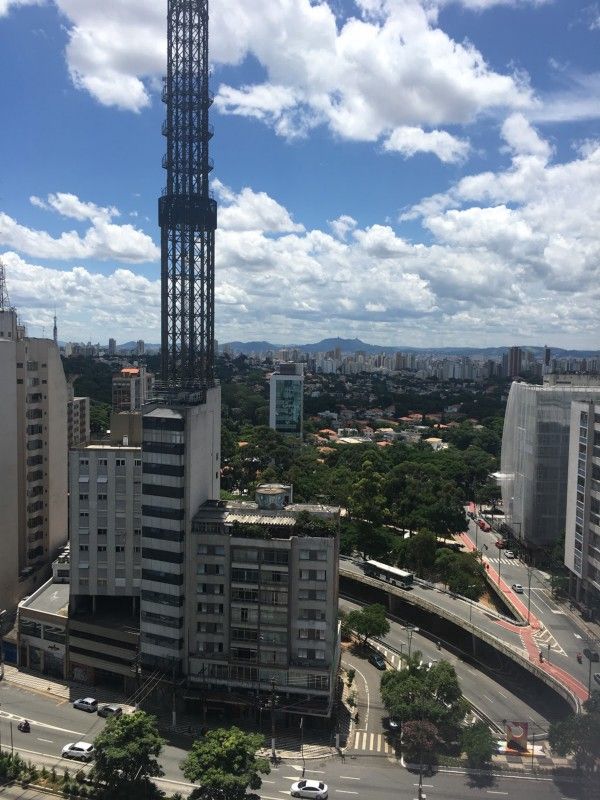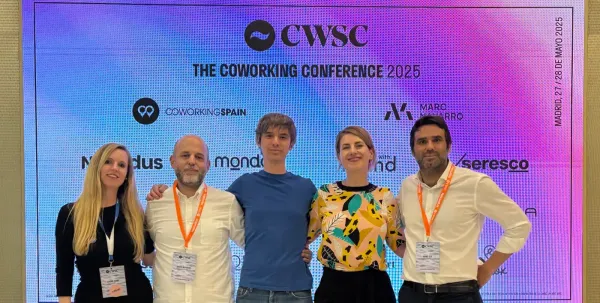We spoke with João Guirau and Laura Gurgel from Encontro Coworking Brasil, organizers of one of the leading coworking conferences in Latin America, about everything from the development of coworking in Brazil to the ways that the conference has adapted to the changing realities of coworking on the ground.
What does “Coworking” mean to you?
Laura: Above everything, coworking is about collaboration. Creating an environment where sharing ideas is the catalyst for everyone to grow together by co-creating and fostering community development.
João: Coworking is freedom to come and go. It is freedom of thought and exchange of ideas. The more the better and richer for everyone involved.

Do you think there is a common Brazilian coworking scene, or are there different markets depending on the state?
There is one common point which is the interaction and receptive nature of the Brazilian people, no matter where the space is. What changes from space to space is vocation, the profile of each state causes a deliberate drive of businesses and people, and the way coworkers interact with each space is unique. For example, here in São Paulo, the city is dense with startups, as well as demand for private rooms. But the community is always very active.
What makes the coworking community in your country special? What are the challenges for operating a coworking space in your country?

Because we are in a very large country, what makes this community special is the variety of cultures. From North to South, there are different developments, but with a single purpose: Grow, improve, and develop together.
The obstacles to run a coworking space are many. The market is relatively new all over the world, but even though it began here in Brazil in 2008, it took more than 5 years to spread, and it was only after the arrival of the big players in 2017 that the topic and work style became part of a bigger conversation.
Not only did people begin to work within these spaces, but the state began to pay attention and think of ways to regulate the market. On one hand it is positive, because it increases security and credibility with the public (as coworking becomes a revitalizer for the cities). On the other hand, it can be negative, as it increases bureaucracy and costs to adapt. Some of these new requirements conflict with the philosophy of coworking, making spaces more complex and more expensive for the public.
Do you have a favorite coworking experience? Would you like to share with us?
Laura: The best experience is always to renew yourself and to be able to see things through different prisms, different points of view. In addition, it is a constant learning to become a better person and manager.
João: Coworking has brought mobility and flexibility to both individuals and businesses. Today it is much easier to grow or shrink, without great costs or losses. An advantage in times of crisis.
A common experience for the two of us was to organize the national conference [Encontro Coworking Brasil]. Each year it’s a completely different experience. Pressure from all sides makes us reinvent the model every year, and the constant growth of the market always attracts new faces. It is very gratifying to be able to spend a little of what we have learned, and better still to learn from those just starting who are full of energy. It is a great thermometer of the market, every year we see a new snapshot of what is happening and what is to come.
Tell us a bit about Meeting Coworking Brazil and how does it compare to other coworking conferences elsewhere?
João: For me they were completely different experiences, here in Brazil I have always participated in the organization and often I do not follow all the panels. This is a pity, since we always try to bring a variety of rich content to inspire everyone that attends. Regarding the two opportunities I had to go to Coworking Europe, I was impacted with incredible content and realized that there are no boundaries when it comes to coworking. My first impression was that we Brazilians are clearly similar to Europeans when it comes to coworking, both by the size of the spaces and styles of the markets, but we dream of being North Americans with gigantic spaces.
A common point between the two opportunities of both the ECW and the CWEU is the exchange we can make with the other attendees who are present. Everytime I made friendships and partnerships that will last for many years.

What are the future plans for Encontro Coworking Brazil?
Transforming the community into the “mother” of Brazilian communities. Make the exchange that started between the initial participants reach each space in the country. Give voice not only internally, but also before the State as a new form of horizontal association and replicate this model in various ways with regional meetings and online content. To become a north, a reference and a network of support for the founders.
What is a great coworking project or initiative in Brazil that we should be aware of? Something that inspired you recently?
We have quite a few in our list. Nex Coworking from curitiba, Eureka Coworking with its community in São Paulo and if we think about people, we have the Walker Massa (Formerly Nós Coworking and Current UFO) and the Matias Vazquez (Sharing EC) who already has more than 10 years in the market but has managed to reinvent himself.
What are your favorite spaces in your country besides your own?
Laura: Co.w, Juntus and Plug
João: Plexi Coworking and Osmose
Cobot helps coworking businesses around the world effectively manage their spaces. You’ll find that our features can help you run your coworking space more efficiently and grow a healthy, and happy, community. Want to try it out to see how Cobot can help you automate your daily administrative tasks? Just sign up for a free trial or a live demo session and reach out to our support to learn about our available discounts.



